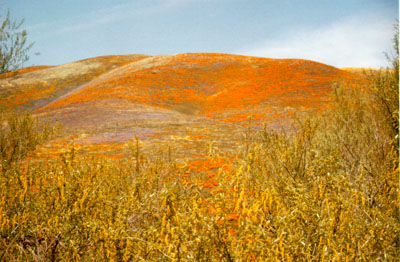
For brief period each year, golden orange California poppies blanket the hillsides.
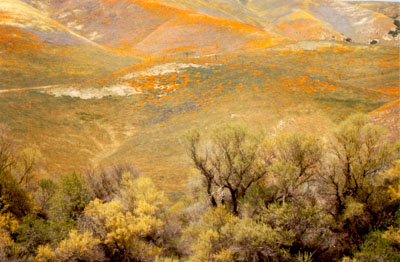
I think the purple flowers are lupine.

I shot these pictures in an area called Gorman, off of Interstate 5 just north of Highway 138.
Music, books, good works, and other reasons for living.



This public forum gives me a strange sense of connectivity; I’m having a conversation with you, but, except for a few, I don’t know who you are. That feeling takes me back thirty years to the nights when I hosted a midnight radio jazz show on WCUW, 91.3 in Worcester, MA. Save for the occassional call-in request from a fellow Clark University student, I had no idea if anyone was listening.
I suppose that is a sensation shared by writers, painters, and all creators of works presented in absentia, so to speak. Even musicians have no idea what feelings they evoke for people listening to their recordings, but at least they also get to perform for live audiences.
John Coltrane is reported* to have said:
It seems to me that the audience in listening is an act of participation, you know. And when somebody is moved as you are…it’s just like having another member of the group…the emotional reaction is all that matters.
As potentially inspiring for the creator as live performance might be, it is not something to which I aspire, for I am prone to stage fright. I vaguely remember my mother telling me about a preschool dance recital where, afraid to go on, I danced my part in the wings, and I clearly remember a few childhood piano recitals that left me quivering, if not cowering. I don’t quiver or cower too much these days, but butterflies still visit me prior to facing any live audience.
[*The Coltrane quote came from Frank Kofsky’s Black Nationalism and the Revolution in Music, but I read it in Neil Leonard’s Jazz: Myth and Religion (Oxford University Press, 1987).]
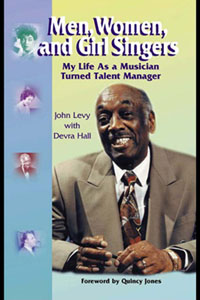 Creative nonfiction, sometimes called narrative nonfiction, is my genre of choice. Actually, it’s more of a content description than a genre – to me it simply means using creative writing techniques such as scenes and dialogue and description to tell a true story. Storytelling is what it’s all about, spinning a good yarn that happens to be factual. That true story might be a biography, or a memoir, or about a subject such as a racehorse or heart transplants or orchids. When I began writing John Levy’s autobiography, I knew that it would never be a bestseller. I wanted to preserve John’s legacy as a manager who believed in building an artist’s career for the long-run (as opposed to today’s “one hit wonders”) and to give jazz fans an entertaining look behind the scenes. With one thousand or so copies sold over the last few years, the book continues to sell, a few at a time, here and there, and we occassionally get a piece or two of fan mail like this one received last Friday:
Creative nonfiction, sometimes called narrative nonfiction, is my genre of choice. Actually, it’s more of a content description than a genre – to me it simply means using creative writing techniques such as scenes and dialogue and description to tell a true story. Storytelling is what it’s all about, spinning a good yarn that happens to be factual. That true story might be a biography, or a memoir, or about a subject such as a racehorse or heart transplants or orchids. When I began writing John Levy’s autobiography, I knew that it would never be a bestseller. I wanted to preserve John’s legacy as a manager who believed in building an artist’s career for the long-run (as opposed to today’s “one hit wonders”) and to give jazz fans an entertaining look behind the scenes. With one thousand or so copies sold over the last few years, the book continues to sell, a few at a time, here and there, and we occassionally get a piece or two of fan mail like this one received last Friday:
I finally received my copy of Men, Women and Girl Singers on Tuesday. I ordered it through Borders Books here in Emeryville. They got it for me within one week which was really fast.
I can’t put it down…last night I read through to daybreak… Thank God I’m on vacation this week…I’m usually up for work at 5 am. I simply could not stop reading… you are a good storyteller. The story about Otis Wilson tickled me to near ’bout death. I could not contain myself as I visualized it.
This is very interesting and entertaining reading…thanks for writing and sharing this era.
Here’s the Otis Wilson story mentioned by our correspondent:
Joe Williams used to tell my favorite story about Art Tatum and a policeman named Otis Wilson, with whom I went to school. Otis became a policeman working nights in this real tough neighborhood. When he got off work he used to come by the after hours joint and listen to the music. One morning when Tatum was playing, some drunk started up the jukebox. According to Joe, “Otis Wilson grabbed this cat and beat him all the way down the steps and put him in jail. It was like he’d broke the law.â€
When the paddy wagon came and the white cops asked what the man had done, Otis said, “He disturbed the peace. Book him for disturbing the peace.â€
You can read more about John, and the book, on his website.
If you’re a regular here, you’ll know that I’ve mentioned Bob Brookmeyer before, twice with regard to the Thad Jones – Mel Lewis Orchestra (here and here) and once with respect to ArtistShare. The other day, it was last Thursday, around lunchtime, I was listening to Get Well Soon, a Brookmeyer CD I had just bought. A few hours later, the front doorbell rings. I can see the door from my office window and there’s a guy standing there, his arm in a sling, holding a CD. 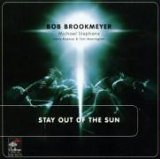 So I open the door, he hands me the CD — Bob Brookmeyer’s Stay Out Of The Sun — and says, “I’m Michael Stephans. I’m a friend of Bob’s and I live just four houses down the block from you.” Now I’ve lived here for almost seven years, and he’s been there for at least six, and we never knew of one another until now. It took a nudge from Bob and encouragement from a mutual neighbor to get Michael to drop in, and I am glad that he did. (By the way, Michael is the drummer on this very beautiful CD.)
So I open the door, he hands me the CD — Bob Brookmeyer’s Stay Out Of The Sun — and says, “I’m Michael Stephans. I’m a friend of Bob’s and I live just four houses down the block from you.” Now I’ve lived here for almost seven years, and he’s been there for at least six, and we never knew of one another until now. It took a nudge from Bob and encouragement from a mutual neighbor to get Michael to drop in, and I am glad that he did. (By the way, Michael is the drummer on this very beautiful CD.)
Subsequently, Michael read my posting about Alec Wilder and sent me the following email:
I had the chance to be in the orchestra that premiered a saxophone concerto he wrote for Zoot [Sims] many years ago, and meeting him was daunting, but fun. One of my favorite collections of his tunes is Bob’s “7 x Wilder” with your dad [Jim Hall], Bill Crow, and Mel [Lewis]. The music still breathes so beautifully…
I am embarassed to say that I am not familiar with this recording (I had to look it up, it’s a 1961 Verve LP), but I plan to get my hands on a copy ASAP.
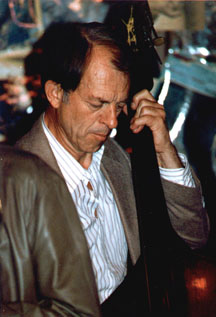 The jazz family is of the large extended variety, and that makes the jazz world very small, connecting people with much less than six degrees of separation. So it should not come as any great surprise that Rifftides and DevraDoWrite share quite a few readers in common. One of the people who found me by way of Rifftides (thank you Doug Ramsey) is bassist Bill Crow.
The jazz family is of the large extended variety, and that makes the jazz world very small, connecting people with much less than six degrees of separation. So it should not come as any great surprise that Rifftides and DevraDoWrite share quite a few readers in common. One of the people who found me by way of Rifftides (thank you Doug Ramsey) is bassist Bill Crow.
Bill Crow was a musical chameleon in his youth, playing trumpet, baritone horn, alto sax drums, and valve trombone. He didn’t take up the bass until he was in his early 20s. Within a few years he was playing bass with Stan Getz, Marian McPartland, and Gerry Mulligan, to name just three, and he never looked back. That was in the 1950s. His credits as a writer also date back to the 1950s with his record and book reviews for Jazz Review. In 1991, Oxford University Press published Jazz Anecdotes, a collection of Bill’s stories that was voted Best Jazz Book of 1991 in a Jazz Times readers’ poll. Two years later, they published a second volume, From Birdland to Broadway: Scenes from a Jazz Life
I’ve known Bill (or more accurately, Bill has known me) since I was a little kid — at one time my dad sublet Bill’s apartment at 22 Cornelia Street. Bill also has a connection with Marian McPartland (about whom I recently wrote) as he was the bassist in the McPartland Trio when it was named “Small Group of the Year” by Metronome (1955). Also, coincidentlly, in the same issue of The Washington Post wherein Terry Teachout recommended the Alec Wilder book that prompted me to talk about Marian a few days ago, Jonathan Yardley recommended Bill’s book (read it here).
So what’s Bill Crow up to now?
I’m playing a lot with a guitarist named Doug Proper, who lives in upper Westchester County. Good drummer, Gerry Fitzerald, and the fourth member of the group is often Joe Beck, who is a monster guitar player.
When Joe can’t make it, we sometimes have John Abercrombie, and sometimes a good alto player named Andrew Beals.
Tonight I’m driving up to the New Paltz area to play with the Kansas City Sound, a band that reveres the Old Testament Basie book. Harvey Kaiser, a saxophonist, is the leader, and we often have Eddie Bert on trombone, Fred Smith on trumpet and a variety of piano players.
Last week I subbed for Earl May on a band that plays the old Ellington repertoire, so I’m getting my nostalgia kicks. I really know how to play that music, so it is nice to be asked to do so.
If you noticed that I didn’t give you a link to Jazz Anecdotes, that is because Bill also happened to mention that Oxford has asked him to make a revised edition.
I’ve added a new preface and about 150 new stories, and they’re going to put it out with a slightly altered cover, calling it “Jazz Anecdotes, Second Time Around.” Should be ready this fall, I think.
I’ll be looking for it, meanwhile you can get a taste of Bill’s stories online in his monthly Band Room column for Local 802’s Allegro. (You’ll have to click on Publications and select Band Room for your search.)
Well, this is my fiftieth post on DevraDoWrite and the end of my seventh week as a blogess. I hope you enjoy reading my posts as much as I am enjoying writing them.
Apropos of everything and nothing, but especially recent postings on the writing life, here are two quotes:
“…the power isn’t in the memory of the story; the power is in the telling of the story. The telling is what holds the moment, makes it immortal.” — Walt Harrington, The Everlasting Stream
“…the essayist-the creative nonfiction writer-must also be a thinker, a critic, and a social commentator.” — Lee Gutkind, The Art of Creative Nonfiction
The title of chapter eight in Gutkind’s book is also a phrase worthy of contemplation: “Think Globally, Act Locally.”
P.S. I’m off to hear a wonderful trio led by bassist Ron Carter with Mulgrew Miller on piano and Russell Malone on guitar. If you live in the greater Los Angeles area, you’ve got to get to The Jazz Bakery to hear them — they’ll be there through Sunday.
As I have been wrestling with ideas for a memoir (earlier memoir musings here), I found it of particular interest when Cup of Chicha took exception to a piece in the Seattle Post-Intelligencer titled “Confessions of a writer who didn’t pen a memoir.†She wrote:
I have no problems with D. Parvas’s disdain for “wasted youth†memoirs (Smashed: Story of a Drunken Girlhood, Runaway: Diary of a Street Kid, Rolling Away: My Agony With Ecstasy), but I’ve a number of problems with Parvas’s plot-based prescription for the genre…
As one who reads for thoughts and language and rarely plot, I’d like to suggest that the boring and insignificant among us can sometimes write worthy memoirs, too….
Although I don’t think that anyone is boring or insignificant, I basically agree with her in that it’s not necessarily what we’ve done that is of value. Vivian Gornick may have said it best in the foreword to “Living to Tell the Tale,†by Jane Taylor McDonnell:
“…what happened to the memoirist is not what matters; it matters only what the memoirist makes of what happened.â€
The rant against memoir is an old one. In October of 1997, Vanity Fair ran James Wolcott’s article titled “Me, Myself and I,†wherein he denounced the “me-first sensibility” of memoirists, calling them “navel gazers.†Of course myopically self-involved and/or insufferably solemn writers who confuse honesty with confession do exist, and I won’t be reading their words. But as Lee Gutkind points out in his own memoir Forever Fat: Essays by the Godfather
there’s also an explosion of altogether brilliant nonfiction prose being written today by people who can reveal their feelings or the feelings of the people about whom they are writing while communicating compelling information and striking some sort of universal chord.
Universality seems to be the key. So what compelling information have I to share, and what universal truths can I tap? I must discover the answers to those questions before I can craft a reader-worthy tale. The memoirist’s job is “to lift from the raw material of life a tale that will shape the experience, transform an event, deliver wisdom†(Vivian Gornick) “such that the minutia of living becomes the meaning of life†(Walt Harrington, The Everlasting Stream).
“Diablog” — wish I’d thought to coin that word. I don’t know that he’s the first, but I just read it on Doug Ramsey’s new blog site called Rifftides. If the first day’s offerings are any indication, and I’m sure that they are, this site is going to tie with About Last Night as my absolute favorite. In the spirit of full disclosure, Doug is a good friend with whom I share a love of jazz, journalism and je ne sais quoi prose. Go see for yourself.
One of the things I love about the blogosphere is the chance encounter with old friends; it’s like strolling to the store for a quart of soy milk and bumping into someone you haven’t seen in ages. Of course, out here in Altadena, we don’t stroll to the store, but you get the idea. Anyway, this morning I was delighted to run into Alec Wilder, courtesy of Terry Teachout and The Washington Post .
I used to go night after night to hear Marian McPartland play at The Cookery, and in later years at Bemelmans Bar at the Carlyle Hotel. She and Alec were close friends and he was in attendance more often than not. Alec was usually alone, and after Marian introduced us, and he was satisfied that I was really there to listen and appreciate the music, he would invite me to sit with him.

He had a gruff exterior that completely evaporated when he smiled. I thought him to be rather professorial, with his tweed jacket and pipe, always a book or two on hand, and forever scribbling notes to himself. Back then, my knowledge of Alec’s musical work was limited to familiarity with a handful of songs that he wrote and which Marian often played — I’ll Be Around, While We’re Young and It’s So Peaceful in the Country being a few of the most well-known.
I wish I could have known him better, and longer. Thinking about those times led me to my bookshelf for a visit with Marian via All In Good Time her book of autobiographical essays about some of the people she’s known — Alec Wilder: The Complete Composer is the title of the last chapter. Marian describes the first song that Alec wrote for her:
He airily tossed me a sheet of music, on which was written, “Jazz Waltz for a Friend — a small present from Alec Wilder.”
I was delighted, and I couldn’t wait to play the piece. It had a haunting melody, which had a way of turning back on itself that I found fascinating. It was deceptively simple to play, yet hard to memorize and improvise on. Many of Alec’s pieces are that way, but they are rewarding, for as you delve into them and explore their intricacies, you find fresh ways to go. Jazz Waltz for a Friend became a part of our trio repertoire, just as Alec became part of my audience from them and on.
One of my favorite CDs by Marian is her solo concert Live at Maybeck Recital Hall, and the last track is, you guessed it, Alec Wilder’s I’ll Be Around.
In Culture in the Age of Blogging (read it in Commentary), Terry Teachout writes of
…stand alone journalists,” a term that refers to self-publishing, self-supporting professional journalists who are unaffiliated with the MSM [main stream media].
He then takes the discussion beyond the blogosphere and goes on to write:
In an analogous development, professional artists have started using the web to market their wares without resort to distributors or other middlemen…
and cites Maria Schneider’s recording project via ArtistShare as an example of how it can be done.
The phrase “other middlemen” led me to think about another issue, one that, while not directly on point vis a vis the Teachout piece, is no less important. If you read my recent posting about ArtistShare then you know that I am a supporter of this business model and I love the idea of focusing on the creative process instead of the final product. I will not lose any sleep or shed any tears when distributors and rack-jobbers become obsolete — I haven’t set foot in a record store in many years and my trips to bookstores grow fewer and fewer — but I do worry about a different group of middlefolk: sound engineers, graphic artists, text editors, and others whose skills add value to an artist’s original creation. No artist should go it all alone, unassisted, although many think that they can, and therein lay my misgivings about this do-it-all-yourself-with-technology age in which we live.
A few versatile artists may be supremely talented on multiple fronts, but culture consumers beware when singers and musicians and writers start mixing their own audio, designing their own packages, and editing their own words. The idea of self-sufficiency brings with it feelings of power and control; it can be quite intoxicating, and it can save you money too. I myself am not immune to the lure, and have been giving a lot of thought as to how I might apply such a model to my own writing career. But hopefully artistic considerations will prevail over commercial concerns. Before I sign on to become my own chief cook and bottle washer, I will take a good look at my own skill set and ask myself if I am really the best one for the job. More likely than not, the answer will be “no.” Besides, technology-enabled fissiparous tendencies be damned, creativity benefits from collaboration, and I can use all the help I can get.